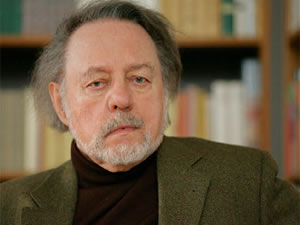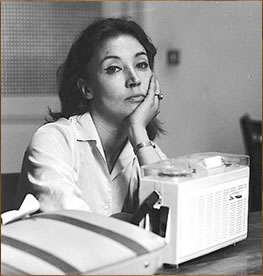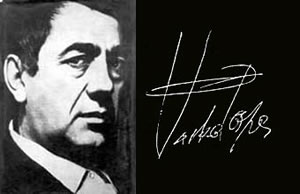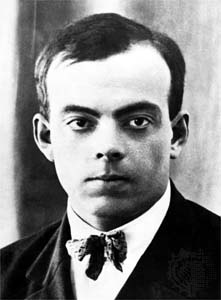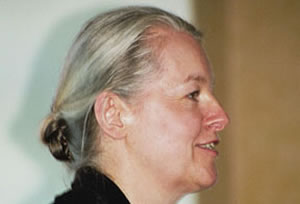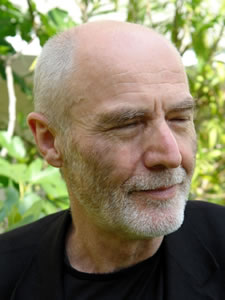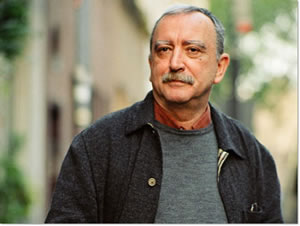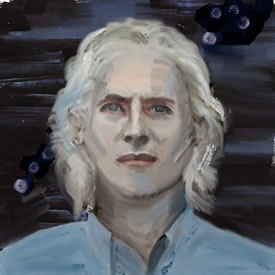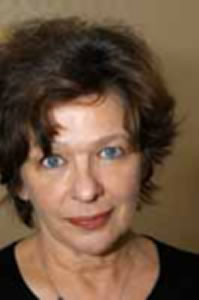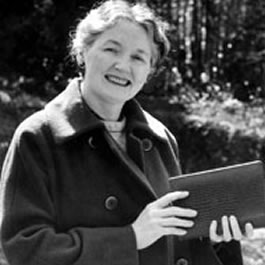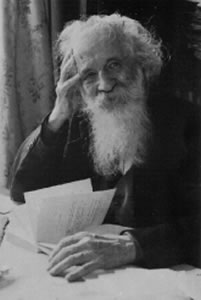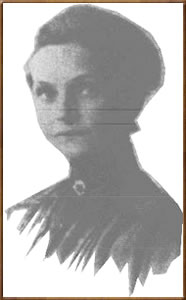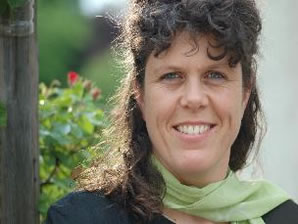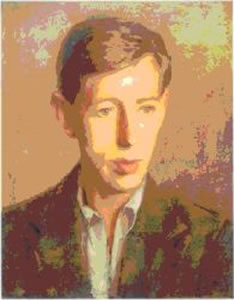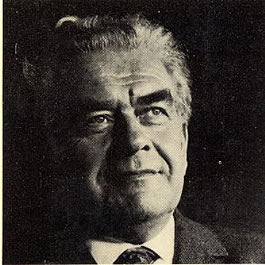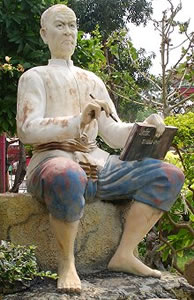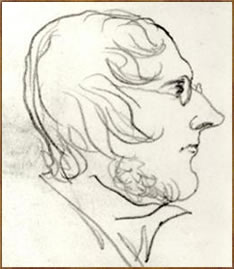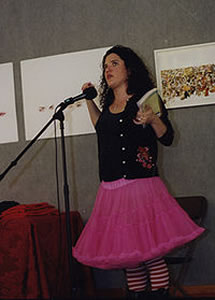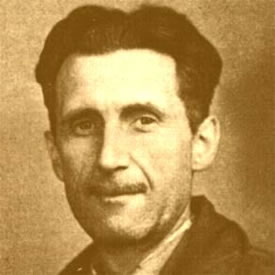De Poolse dichter, schrijver en Nobelprijswinnaar Czesław Miłosz werd geboren in Šeteniai op 30 juni 1911. Zie ook alle tags voor Czeslaw Milosz op dit blog.
Mijnheid
‘Mijn ouders, mijn man, mijn zuster.’
Ik ontbijt in een cafetaria, luister aandachtig.
Vrouwenstemmen ritselen en vinden hun vervulling
in het ritueel dat we zo nodig hebben.
Tersluiks beschouw ik hun beweeglijke monden.
En ik geniet ervan hier op aarde de zijn,
nog een ogenblik, samen, hier op aarde,
om onze kleine mijnheid te celebreren.
De zin
‘Eenmaal dood zal ik de voering van de wereld zien.
De achterkant, voorbij de vogel, berg, zonsondergang,
de ware betekenis, die om ontcijfering roept.
Wat onverenigbaar was, wordt nu verenigd.
Wat buiten ons begrip viel, zal begrepen worden.’
‘Maar als de wereld nu geen voering heeft?
Als de lijster op de tak geen enkel teken is,
alleen een lijster op een tak, als de dagen en de nachten
elkaar opvolgen en zich niet bekommeren om een zin
en er op aarde niets is buiten deze aarde?’
‘Al zou het zelfs zo zijn, dan nog blijft het woord
dat, eenmaal gewekt door vergankelijke lippen,
zal rennen, rennen als een onvermoeibare koerier,
over interstellaire velden, wentelende melkwegen
en protesteren, roepen, schreeuwen.’
Tafel [2]
In deze auberge aan de wankele pracht van de zee
beweeg ik me als in een aquarium, bewust van mijn vergaan,
temidden van ons, zo sterfelijk dat we nauwelijks leven.
Hoewel we ook rouwen, verheugt mij deze gemeenschap
van blikken, gebaren, aanrakingen, van nu en eeuwen her.
Ik dacht dat ik de stilzetting van de tijd zou afsmeken,
maar ik leer me verzoenen, zoals anderen voor mij.
En ik voel alleen aan de dingen die hier blijven:
de messen met hoornen heft, de tinnen schotels,
het blauwe porselein, sterk hoewel breekbaar,
en, als een wachter-rots tussen
troebele golven,
glimmend gepolijst, deze zware
tafel van hout.
Vertaald doorGerard Rasch

De Duitse schrijfster Juli Zeh werd geboren in Bonn op 30 juni 1974. Zie ook alle tags voor Juli Zeh op dit blog.
Uit: Spieltrieb
“Nichts wies auf einen Donnerstag hin. Fern von den geregelten Abläufen der Städte, fern von Schulalltag, Morgenzeitung und Abendnachrichten verloren die Namen der Wochentage mit solcher Geschwindigkeit an Bedeutung, dass man sich fragte, ob sie ihre Bezeichnungen jemals zu Recht getragen hätten. Die Zeit sprang aus ihrem Korsett, dehnte und streckte sich nach Belieben und ließ die Annahme, man sei erst anderthalb Tage zuvor in Dahlem angereist, als dummdreisten Trick des Erinnerungsvermögens erscheinen. An gefühlter Zeit waren seit der Ankunft zwei Wochen vergangen, und Ada fing bereits an, ihr gewöhnliches Leben für unglaubwürdig zu halten. Mit etwas mehr Erfahrung hätte sie im prompten Plausibilitätsverlust der eigenen Herkunft ein zeitgemäßes Talent zum Vagabundieren erkannt. So aber hielt sie den Effekt für eine Folge des ungewohnten Alleinseins unter Menschen, das sich gegenüber dem üblichen Alleinsein ohne Menschen durch spürbar höheren Kräfteverbrauch auszeichnete.
Gegen zehn am Abend beendete Smutek die Vorbereitungen zu einer fiktiven Stadtführung durch Wien. In den verschiedenen Räumen des Hauses bereiteten Schülergruppen die Darstellung von Sehenswürdigkeiten und, Oxymoron hin oder her, von wichtigen historischen Ereignissen vor, bemalten Tapeten, probten dramatische Szenen, klebten Photos und Postkarten an die Wände. Ada hatte darum gebeten, wegen mangelnder Teamfähigkeit ein Stück Musil auswendig lernen und vortragen zu dürfen. Als Smutek die Schüler mit fröhlicher Stimme und geräumigen Handbewegungen entließ, drehte sich in ihr noch immer ein Geschwader nicht zu Ende gedachter Gedanken, so dass die Aussicht, den restlichen Abend zwischen menschlichen Kapseln unbekannten Inhalts zu verbringen, unerträglich erschien. Ungesehen gelangte sie in die Eingangshalle, schnürte die Laufschuhe zu und floh ins Freie.

De Nederlandse schrijfster Jacqueline Zirkzee werd geboren in Leiden op 30 juni 1960. Zie ook alle tags voor Jacqueline Zirkzee op dit blog.
Uit: De waterkar
„Ik ben een reiziger uit noodzaak, niet uit liefde. Overal ter wereld kom ik mensen tegen die mij benijden om mijn werk, dat me letterlijk overal brengt, en die verbaasd zijn dat ik hun enthousiasme niet deel. Meestal probeer ik mijn gevoelens te verbergen, want je wordt zo gauw voor blasé aangezien. Met name verre bestemmingen vertegenwoordigen voor mij voornamelijk een onaangename confrontatie met armoede, vervuiling en verspilling. Het gelukkigst ben ik wanneer mijn werkgevers mij vragen om enkele weken in Europa of de Verenigde Staten door te brengen,
maar helaas gebeurt dat niet zo vaak.
Ik ben adviseur voor een internationale investeringsmaatschappij en het is mijn opdracht om organisaties en projecten in het buitenland te bezoeken die mogelijk interessant zouden kunnen zijn voor onze maatschappij. Zo’n dertig procent van onze belangen zit in het bedrijfsleven van de zogeheten emerging markets, de opkomende economieën; wat we vroeger derdewereldlanden noemden. Dit klinkt nobeler dan het is, want uiteraard investeren wij uitsluitend in financieel gezonde en veelbelovende ondernemingen. Naar aanleiding van mijn analyse ter plaatse wordt besloten of mijn werkgever geld in een bepaald bedrijf gaat steken.
Wanneer ik op reis moet is het voornamelijk naar de meest achterlijke gebieden die zich op deze aardkloot bevinden. De aldaar aanwezige mogelijkheden om te investeren dienen zeer grondig onderzocht te worden en dat laat de directie bij voorkeur aan mij over. Vanwege mijn kritisch inzicht, zoals men beweert. Het is waar dat mijn maatstaven hoog zijn, en dat is precies de reden waarom ik au fond een afkeer van mijn werk heb. Vrijwel nergens in die regionen vind je immers een betrouwbare zakelijke onderneming, gebaseerd op voldoende kapitaal en met een hoge productiviteit. Een afspraak punctueel nakomen blijkt vaak al een hele opgave. Mijn rapporten vallen in de meeste gevallen dan ook negatief uit, en dat spijt mijzelf soms meer dan de maatschappij, lijkt het wel.”
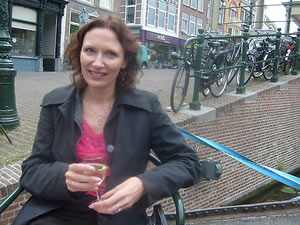
De Algerijnse schrijfster Assia Djebar (eig.Fatima-Zohra Imalayen) werd geboren op 30 juni 1936 in Cherchell, een kleine kustplaats in de buurt van AlgiersZie ook alle tags voor Assia Djebar op dit blog.
Uit: Fern von Medina (Vertaald doorHans Thill)
»Die Weigerung, mit der sie, die geliebte Tochter Mohammeds, den Nachfolgern entgegentritt, wird sie lange in sich lebendig halten, als einen Splitter, den sie mit sich trägt. Es geht um ihre Rechte als Tochter, um ihr Erbteil. Nein, hier geht es nicht um einen Garten, nicht um einige Güter in Medina und Umgebung, sondern um ein Symbol von weit höherer Bedeutung; so versteht es Fatima.>Nein<, sagt Fatima anklagend, >ihr habt die Absicht, mir meine Rechte als Tochter zu nehmen!< Sie könnte noch weiter gehen, könnte sagen: >Mohammed ist kaum tot, da habt ihr die Stirn, sogleich seine eigene Tochter zu enterben, die einzige lebende Tochter des Propheten!< Die entrechtete Fatima steht an der Spitze einer endlosen Prozession von Mädchen …Mit ihren Forderungen tritt Fatima vor Abu Bekr. DasZimmer ist voll mit Gefährten, sie bleibt aufrechtstehen; keinen dieser Männer würdigt sie eines Blickes.«

De Mexicaanse schrijver, dichter, essayist en vertaler José Emilio Pacheco werd geboren in Mexico City op 30 juni 1939. Zie ook alle tags voor José Emilio Pacheco op dit blog.
Uit: Self-consuming second-person fiction: Jose Emilio Pacheco’s “Tarde de Agosto” (door Kimberly A. Nance)
“Pacheco’s “Tarde de agosto” (from the collection of stories El viento distante [The Distant Wind]) juxtaposes two commonplace versions of male initiation in a fresh and ironic take on both: “boy embarrasses himself in front of first love” and “war makes men of boys.” Told in the Spanish second-person familiar tu by a narrator who is never explicitly identified, the action takes place in a single afternoon during the narratee-protagonist’s adolescence. Sleeping, waking, or immersed in his Bazooka novels, the quiet boy dreams of glorious wars and of the only person who pays him any attention: Julia, his twenty-year-old cousin. On the afternoon in question he is sent along with Julia and her boyfriend, Pedro, to a park where the usual posted prohibition against disturbing the animals or picking the flowers sparks fantasies of desperate forays into enemy territory. Transported to “Tobruk, Narvik, Dunkerke, Las Ardenas, Iwo Yima, Midway, Monte Cassino, El Alamein, Varsovia” (23), the boy becomes a combat hero, capable of any action. When Julia mentions she would like to take one of the squirrels home as a pet and Pedro refuses because “habia cien, mil, cien mil guardabosques para guardar el bosque y las ardillas” (24) (“there were a hundred, a thousand, a hundred thousand rangers on patrol to protect the park and the squirrels”) (69),(1) the boy has his orders. A moment later he is cornered in a tree and both the branch and his soldierly courage begin to give way. Ten interminable minutes pass before he can descend, pale and tearful and bereft of his illusions of valor. Julia reproaches Pedro for laughing at him, and no one speaks during the tense ride home. Although the boy consigns the Bazooka collection to the flames of the boiler, the memory of the afternoon is indelible.“

De Kameroense schrijver Mongo Beti (eig. Alexandre Biyidi) werd geboren op 30 juni 1932 in Mbalmayo, een klein dorp ten zuiden van Yaoundé. Zie ook alle tags voor Mongo Betiop dit blog.
Uit: L’ironie et l’humour dans Le pauvre christ de Bomba de Mongo Beti (door Fernando Lambert)
„On ne peut parler du Pauvre Christ de Bomba de Mongo Beti, sans penser à l’Aventure ambiguëde Cheikh Hamidou Kane.
Ces deux romans nous plongentchacun dans un univers religieux caractéristique. Mais, alors que l’Islam possède de solides racines dans l’Afrique de l’Ouest, le Christianisme apparaît tout à fait étranger au Cameroun. Ses représentants sont considérés par Beti comme les agents les plus efficaces de l’entreprise coloniale. Cela suffit sans doute à expliquer pourquoi l’Église catholique est placée au centre du roman, le Pauvre Christ de Bomba, de sorte qu’elle constitue une des structures essentielles, sinon la principale, de l’univers romanesque de Beti. Elle est présente aussi dès la première oeuvre, Ville cruelle3, où elle met son pouvoir moral au service de l’administration coloniale.
Son influence demeure implicite dans Mission terminée4. Par contre, dans le quatrième roman, le Roi miraculé5, elle revient au premier rang : elle entre en conflit avec les valeurs fondamentales de la société traditionnelle, en particulier la polygamie.
Au-delà de la thèse anti-cléricale et anti-chrétienne que beaucoup de critiques y ont d’abord vue, le Pauvre Christ de Bomba illustre bien la manière dont Beti tire sa matière romanesque du monde missionnaire camerounais qu’il connaît bien. Ce roman, qui représente très dignement la littérature de
contestation en Afrique, permet de mettre en lumière ce qui se révèle être l’originalité de Beti. L’auteur est visiblement hanté par le monde colonial en général, et d’une façon spéciale par le monde missionnaire.“
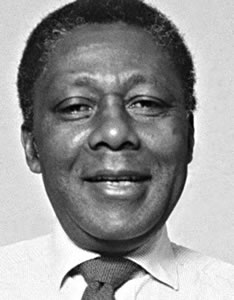
De Franse dichter, romanschrijver en essayist Georges Duhamel werd geboren op 30 juni 1884 in Parijs. Zie ook alle tags voor Georges Duhamelop dit blog.
La devinette
Oh ! Papa ! Toi qui sais tout
Toi qui lis dans tous les livres
Et même dans le journal,
Où les lettres sont si fines,
Oh, Papa ! Devine ! Devine !
Ses yeux sont deux billes de verre,
Ses oreilles, feuilles de chou,
Il a mis la peau de son père
Avec son nez en caoutchouc
Il fait peur aux petits enfants
Qu’est-ce que c’est ?
C’est l’éléphant !
Il dit tout ce qu’on lui fait dire
Il est vert. Il parle du nez.
Il nous demande avec colère
Si nous avons bien déjeuné
Oh ! Père, tu le reconnais ?
C’est un père, le perroquet !

De Engelse dichter en dramaturg John Gray werd op 30 juni 1685 geboren in Barnstaple, Devon. Zie ook alle tags voor John Gray op dit blog.
IF THE HEART OF A MAN
IF the heart of a man is deprest with cares,
The mist is dispell’d when a woman appears;
Like the notes of a fiddle, she sweetly, sweetly
Raises the spirits, and charms our ears.
Roses and lillies her cheeks disclose,
But her ripe lips are more sweet than those.
Press her,
Caress her,
With blisses,
Her kisses
Dissolve us in pleasure, and soft repose.

Zie voor de vier bovenstaande schrijvers ook mijn blog van 30 juni 2007en ook mijn blog van 30 juni 2008 en ook mijn blog van 30 juni 2009.

